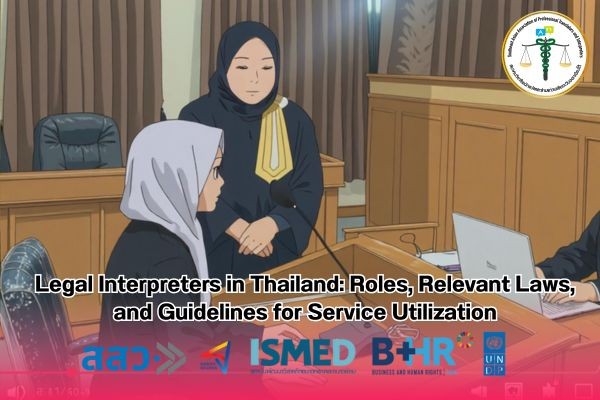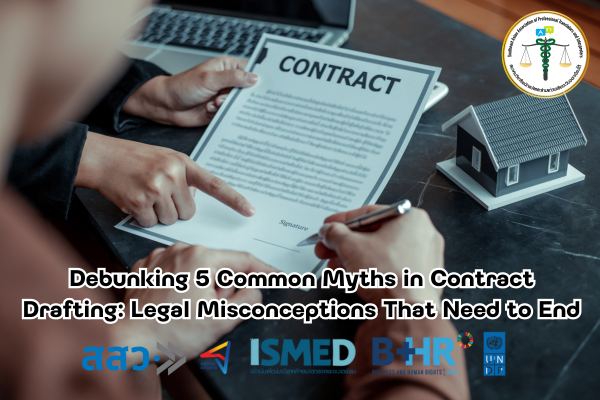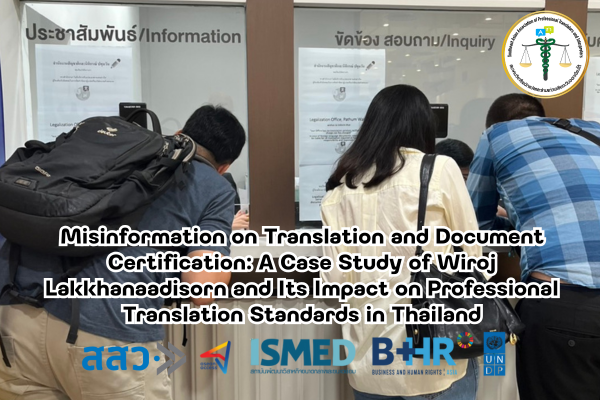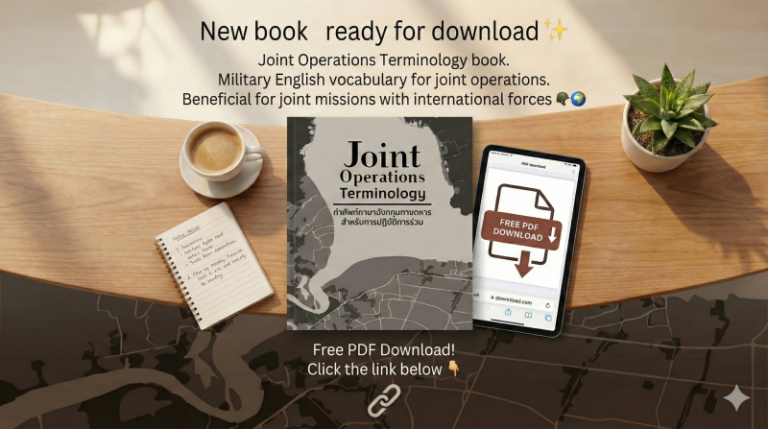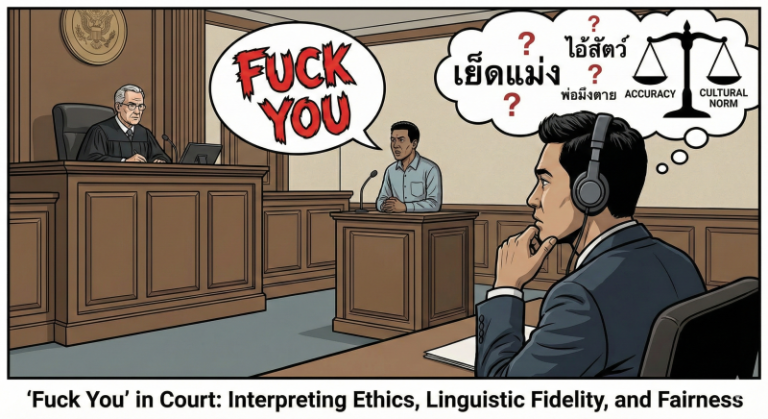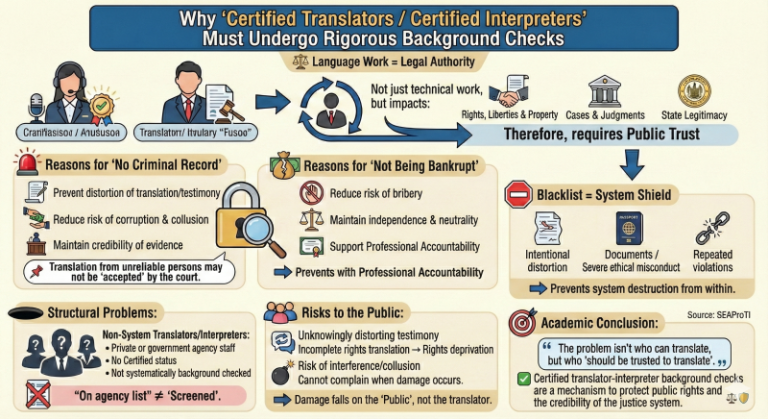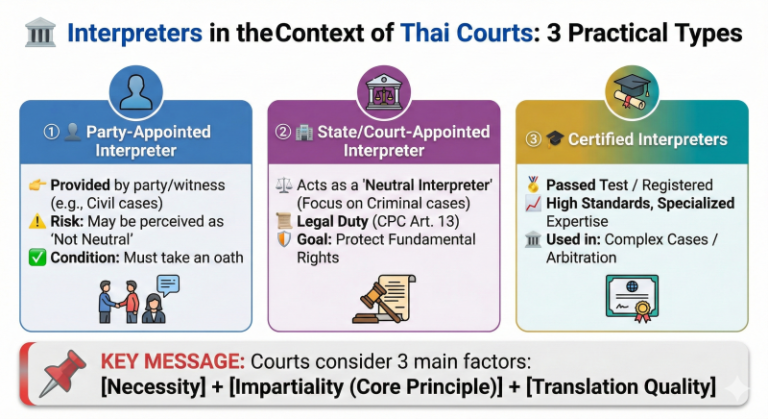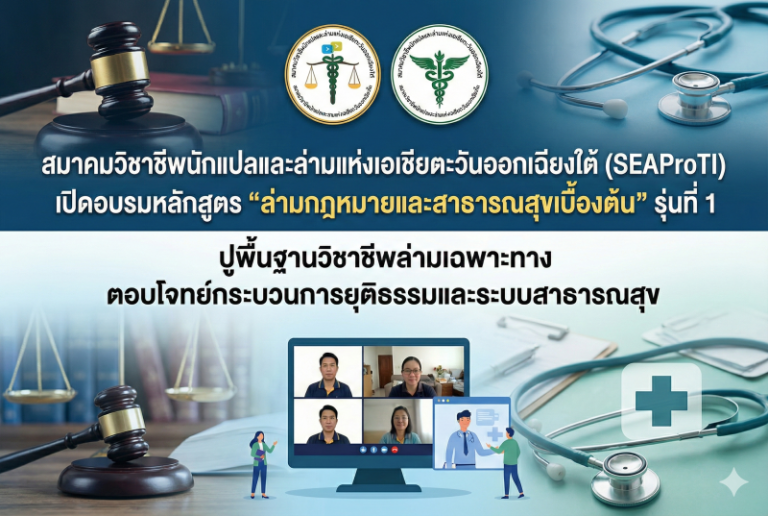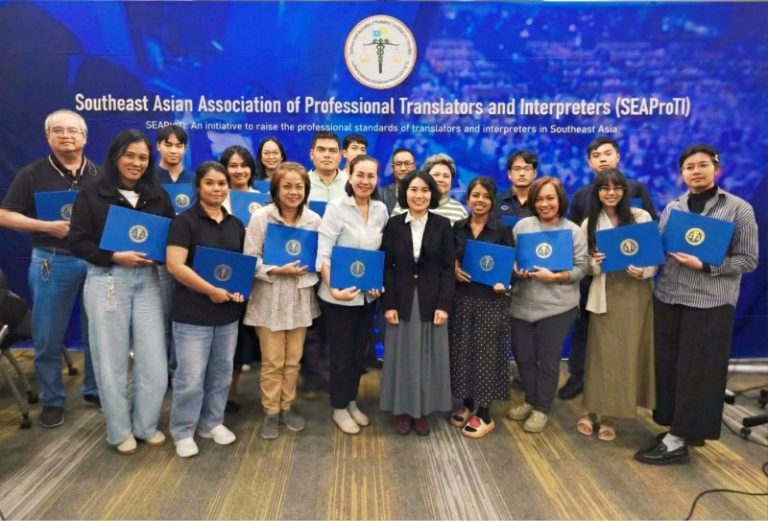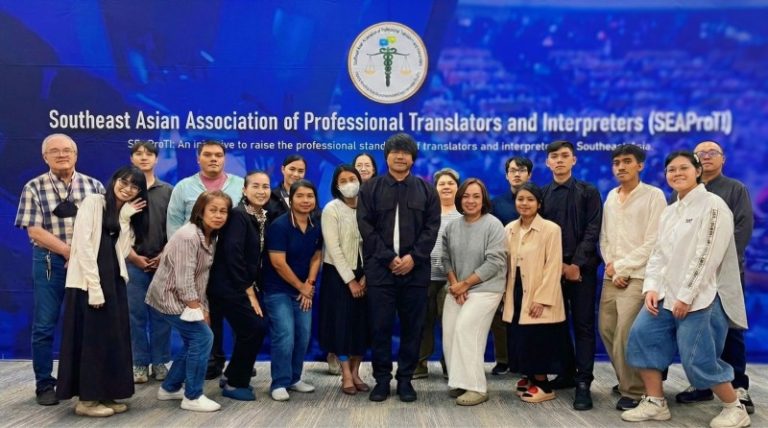Legal Interpreters in Thailand: Roles, Relevant Laws, and Guidelines for Service Utilization
12 August 2025, Bangkok – Legal interpreters, including “court interpreters,” are key actors in ensuring fairness and efficiency in Thailand’s justice system, especially when parties or witnesses are unable to communicate adequately in Thai. This article provides an overview of relevant laws, ethical principles, and best practices for legal interpreting, as well as professional selection criteria. It also examines the interpreter’s role in various stages of legal proceedings, emphasizing accuracy, neutrality, and confidentiality.
Introduction
Accurate, complete, and impartial communication is central to fairness in Thailand’s judicial process (Hale, 2004). When parties or witnesses cannot use Thai effectively, judicial agencies must arrange for interpreters to ensure equal understanding for all parties. The absence of qualified interpreters may result in violations of fundamental rights (González et al., 2012).
Relevant Laws and Regulations
Criminal Procedure Code, Section 13
All investigation, preliminary examination, and trial proceedings shall be conducted in Thai. If a party or witness cannot speak or understand Thai, an interpreter must be provided without delay.
Civil Procedure Code, Section 46
An interpreter shall be provided when a party or any person appearing in court cannot understand Thai, with an oath or affirmation required before the interpreter begins their duty.
Roles of Legal and Court Interpreters
- Verbatim rendering of questions, answers, testimonies, judgments, and relevant documents.
- Maintaining impartiality and avoiding personal opinions.
- Preserving case confidentiality at all times.
- Alerting the court or officers in case of terminology difficulties or potential misinterpretations.
- Declining assignments when conflicts of interest arise or when lacking sufficient linguistic or subject-matter expertise.
- Parties or witnesses cannot understand Thai.
- Participants have hearing or speech impairments (requiring sign language or alternative communication).
- Cases involve technical or legal terminology requiring high precision.
- Investigation stage: Interviews, charge notifications, statement recording.
- Prosecutor/preliminary hearing stage.
- Court trial stage: Criminal, civil, labor, administrative, juvenile, and family cases.
- Mediation and dispute resolution.
- Document-related work: Assisting in filing documents or interpreting judgments alongside document translators.
- Specialized expertise in similar case types.
- Proficiency in legal terminology in both Thai and the target language.
- Impartiality and ethics, with readiness to sign a Non-Disclosure Agreement (NDA).
- Preparation by reviewing case files and issues in advance.
- Recognition by judicial authorities, with a track record of work with courts or prosecutors.
- Punctuality and logistical readiness.
- Commonly charged per half-day/full day or hourly (with minimum hours).
- Additional fees for travel or waiting time.
- A written quotation should clearly state scope, language, time, venue, payment terms, and confidentiality conditions.
- Provide case summaries, issues in dispute, and key terminology in advance.
- Share relevant documents (within legal and attorney guidelines).
- Confirm schedules, courtroom locations, and meeting points.
- Arrange emergency communication protocols.
Not necessarily. Courts or investigators may allow interpreters arranged by the parties, provided they take the oath/affirmation and are deemed competent and impartial by the court.
Can an interpreter explain the law instead of a lawyer?
No. The interpreter’s role is strictly to interpret spoken content, not to provide legal advice.
What if the interpretation is suspected to be inaccurate?
Parties or counsel may raise an objection to the court for review or replacement.
Conclusion
Legal interpreters are essential to safeguarding the right to a fair trial in Thailand. Proper selection and regulation, grounded in legal and ethical principles, are vital. Continued development of interpreter standards in Thailand is necessary to align with international best practices and to support an increasingly multilingual society.
References
- González, R. D., Vásquez, V. F., & Mikkelson, H. (2012). Fundamentals of court interpretation: Theory, policy and practice (2nd ed.). Durham, NC: Carolina Academic Press.
- Hale, S. (2004). The discourse of court interpreting: Discourse practices of the law, the witness and the interpreter. Amsterdam: John Benjamins.
- Criminal Procedure Code, B.E. 2477 (1934).
- Civil Procedure Code, B.E. 2477 (1934).
* The Southeast Asian Association of Professional Translators and Interpreters (SEAProTI) is the first professional association in Southeast Asia to establish a certification system for certified translators, translation certification providers, and certified interpreters.
About SEAProTI Certified Translators, Certification Providers, and Interpreters
The Southeast Asian Association of Professional Translators and Interpreters (SEAProTI) has published official guidelines and eligibility criteria for individuals seeking registration as Certified Translators, Translation Certification Providers, and Certified Interpreters under Chapter 9 and Chapter 10 of the Royal Thai Government Gazette, issued by the Secretariat of the Cabinet, Office of the Prime Minister, on 25 July 2024 (Vol. 141, Part 66 Ng, p. 100). Full text available at: The Royal Thai Government Gazette
Headquarters: 33 Baan Rajakhru Building, Room 402, Soi Phahonyothin 5, Phahonyothin Road, Phayathai Sub-district, Phayathai District, Bangkok 10400 Email: hello@seaproti.com Tel: (+66) 2-114-3128 (Office Hours: 9.00–17.00 HRs/Monday to Friday)
ล่ามกฎหมายในประเทศไทย: บทบาท กฎหมายที่เกี่ยวข้อง และแนวทางการใช้บริการ
ล่ามกฎหมาย (Legal Interpreter) รวมถึง ล่ามศาล และ ล่ามในกระบวนการยุติธรรม ด้วย เป็นกลไกสำคัญที่ช่วยให้กระบวนการยุติธรรมในประเทศไทยดำเนินไปอย่างเป็นธรรมและมีประสิทธิภาพ โดยเฉพาะในกรณีที่คู่ความหรือพยานไม่สามารถสื่อสารภาษาไทยได้อย่างเพียงพอ บทความนี้นำเสนอภาพรวมของกฎหมายที่เกี่ยวข้อง จริยธรรมและแนวปฏิบัติของล่ามกฎหมาย ตลอดจนแนวทางการเลือกและประเมินผู้ให้บริการอย่างมืออาชีพ พร้อมวิเคราะห์บทบาทของล่ามในแต่ละขั้นตอนของกระบวนการยุติธรรม
บทนำ
ในกระบวนการยุติธรรมไทย การสื่อสารที่ถูกต้อง ครบถ้วน และเป็นกลางถือเป็นหัวใจสำคัญของความเป็นธรรม (Hale, 2004) เมื่อคู่ความหรือพยานไม่สามารถใช้ภาษาไทยได้ หน่วยงานในกระบวนการยุติธรรมจึงจำเป็นต้องจัดหาล่ามเพื่อให้มั่นใจว่าทุกฝ่ายเข้าใจเนื้อหาอย่างเท่าเทียม การขาดล่ามที่มีคุณภาพอาจนำไปสู่การละเมิดสิทธิขั้นพื้นฐานของผู้เกี่ยวข้อง (González et al., 2012)
ประมวลกฎหมายวิธีพิจารณาความอาญา มาตรา 13
- กำหนดให้การสอบสวน ไต่สวนมูลฟ้อง และการพิจารณาคดีใช้ภาษาไทย แต่หากคู่ความหรือพยานไม่สามารถพูดหรือเข้าใจภาษาไทย ต้องจัดหาล่ามโดยไม่ชักช้า
- กำหนดให้จัดหาล่ามเมื่อคู่ความหรือบุคคลที่มาศาลไม่เข้าใจภาษาไทย พร้อมพิธีปฏิญาณหรือสาบานก่อนเริ่มปฏิบัติหน้าที่
- ถ่ายทอดแบบตรงเนื้อหา (verbatim) ทั้งคำถาม คำตอบ คำให้การ และคำพิพากษา
- รักษาความเป็นกลาง ไม่ใส่ความคิดเห็นส่วนตัว
- รักษาความลับของคดี
- แจ้งข้อขัดข้องต่อศาลหรือเจ้าพนักงาน หากมีปัญหาทางศัพท์หรือความเข้าใจ
- ปฏิเสธงาน เมื่อมีผลประโยชน์ทับซ้อนหรือขาดความชำนาญในภาษาหรือเนื้อหา
- คู่ความหรือพยานไม่เข้าใจภาษาไทย
- ผู้เกี่ยวข้องมีข้อจำกัดด้านการได้ยินหรือการพูด
- คดีมีเนื้อหาเชิงเทคนิคและศัพท์กฎหมายจำนวนมาก
- ชั้นสอบสวน: สอบปากคำ แจ้งข้อหา
- ชั้นอัยการ/ไต่สวนมูลฟ้อง
- ชั้นพิจารณาคดีในศาล: อาญา แพ่ง แรงงาน ปกครอง
- การไกล่เกลี่ย/ยุติข้อพิพาท
- ประกอบการจัดทำเอกสาร
- ความเชี่ยวชาญเฉพาะทาง: เคยทำงานในคดีประเภทเดียวกัน
- ความถูกต้องทางศัพท์กฎหมาย: เข้าใจทั้งภาษากฎหมายไทยและภาษาปลายทาง
- ความเป็นกลางและจริยธรรม: พร้อมลงนามในสัญญารักษาความลับ (NDA)
- การเตรียมตัว: ขอเอกสารและประเด็นคดีล่วงหน้า
- การยอมรับจากหน่วยงานยุติธรรม: มีประสบการณ์ทำงานกับศาลหรืออัยการ
ความพร้อมด้านเวลาและพื้นที่
- คิดเป็นครึ่งวัน/เต็มวัน หรือชั่วโมง (มีขั้นต่ำ)
- คิดค่าเดินทางและเวลารอเพิ่มเติม
- มีใบเสนอราคาชัดเจนระบุขอบเขตงาน ภาษา เวลา และเงื่อนไขการชำระเงิน
- ส่งสรุปคดีและคำศัพท์สำคัญล่วงหน้า
- ส่งเอกสารที่เกี่ยวข้อง (ตามข้อกฎหมายและคำแนะนำทนาย)
- ยืนยันสถานที่และเวลานัดหมาย
- ต้องใช้ล่ามของศาลเท่านั้นหรือไม่: ไม่จำเป็น หากศาลอนุญาตและผ่านการสาบานตน
- ล่ามอธิบายกฎหมายแทนทนายได้หรือไม่: ไม่ได้
- สงสัยว่าล่ามแปลไม่ถูกต้องทำอย่างไร: ทักท้วงต่อศาลเพื่อพิจารณาเปลี่ยนตัว
สรุป
ล่ามกฎหมายมีบทบาทสำคัญต่อการรับประกันสิทธิในกระบวนการยุติธรรม การเลือกใช้บริการล่ามอย่างเหมาะสมและการกำกับดูแลตามหลักกฎหมายและจริยธรรมจึงเป็นเรื่องจำเป็น ทั้งนี้การบังคับใช้มาตรฐานล่ามในประเทศไทยยังต้องการการพัฒนาต่อเนื่อง เพื่อให้สอดคล้องกับมาตรฐานสากลและรองรับสังคมพหุภาษา
เอกสารอ้างอิง
- González, R. D., Vásquez, V. F., & Mikkelson, H. (2012). Fundamentals of court interpretation: Theory, policy and practice (2nd ed.). Durham, NC: Carolina Academic Press.
- Hale, S. (2004). The discourse of court interpreting: Discourse practices of the law, the witness and the interpreter. Amsterdam: John Benjamins.
- ประมวลกฎหมายวิธีพิจารณาความอาญา พ.ศ. 2477.
- ประมวลกฎหมายวิธีพิจารณาความแพ่ง พ.ศ. 2477.
สมาคมวิชาชีพนักแปลและล่ามแห่งเอเชียตะวันออกเฉียงใต้ (SEAProTI) ได้ประกาศหลักเกณฑ์และคุณสมบัติผู้ที่ขึ้นทะเบียนเป็น “นักแปลรับรอง (Certified Translators) และผู้รับรองการแปล (Translation Certification Providers) และล่ามรับรอง (Certified Interpreters)” ของสมาคม หมวดที่ 9 และหมวดที่ 10 ในราชกิจจานุเบกษา ของสำนักเลขาธิการคณะรัฐมนตรี ในสำนักนายกรัฐมนตรี แห่งราชอาณาจักรไทย ลงวันที่ 25 ก.ค. 2567 เล่มที่ 141 ตอนที่ 66 ง หน้า 100 อ่านฉบับเต็มได้ที่: นักแปลรับรอง ผู้รับรองการแปล และล่ามรับรอง


